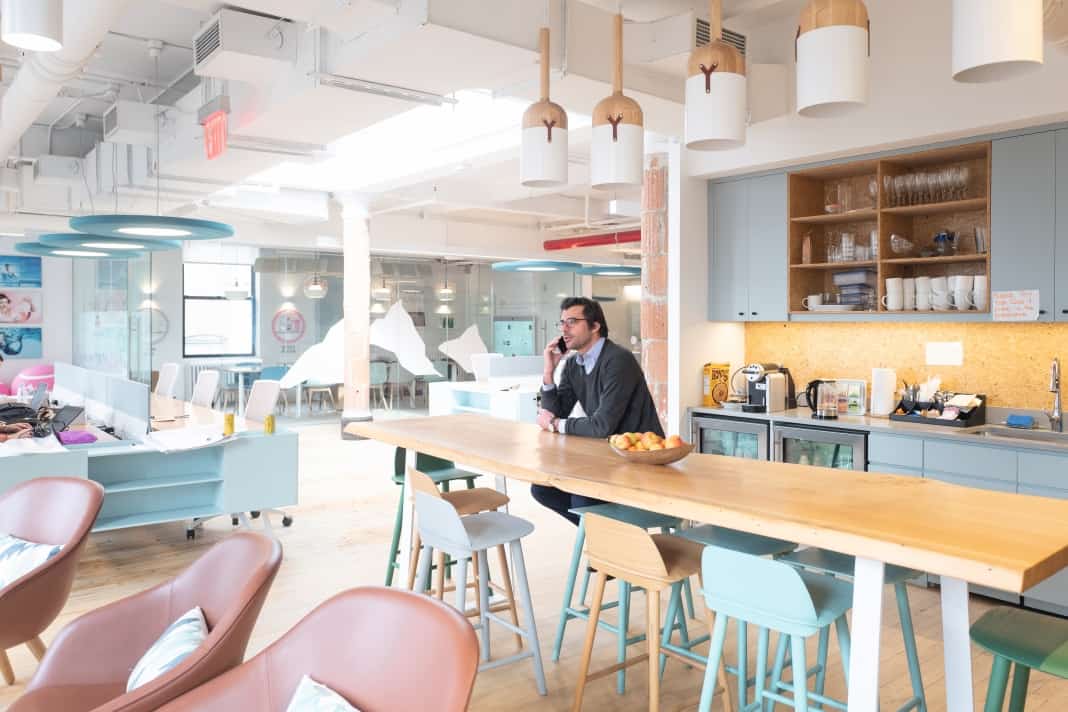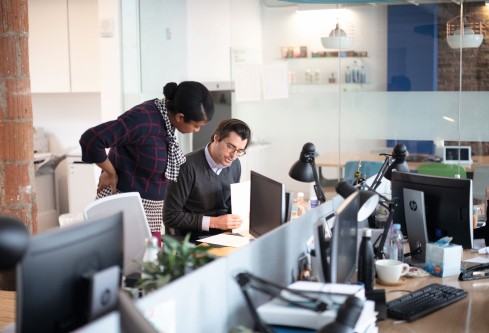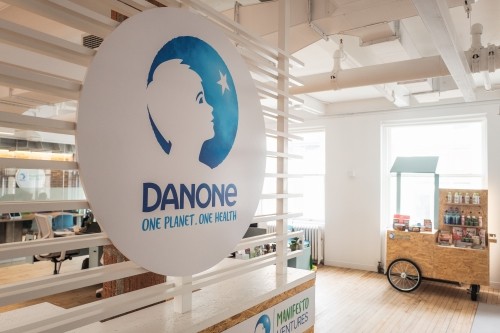Laurent Marcel (H.94): “Our society’s values are revealed in our plates”

We once imagined people gobbling down “meal pills” for lunch. But times have changed. Tomorrow’s food sector will be driven by consumers’ environmental and social values as well as by concerns about nutrition and saving time. While the idea of eating a cricket fricassee or a meatless burger might stand out in our minds, what’s in our plates in the future will probably be more complex and subtle. Richer, perhaps. Laurent Marcel (H.94), General Manager of Danone Manifesto Ventures fund (DMV) in New York City, takes an in-depth look at innovations in the food sector. A future full of potential.
What do you think a typical menu of 2050 might include?
Laurent Marcel: It will be filled with fresh, tasty and environmentally-responsible products. Dishes based on vegetable proteins, vegetables and fruit, none of it very fatty or sweet and without the use of plastic packaging. And for dessert, why not fruit raised in cities? The French start-up Agricool, in which Danone Manifesto Ventures (DMV) has invested, is already growing strawberries in the heart of Paris, with very little water [note: through hydroponics rather than in the ground, using a neutral and inert support].
In science fiction and in many people’s minds, the archetypical foods of the future are capsules and nutraceuticals (foods with medicinal properties). Is this vision out of date?
Laurent Marcel: This is still an important trend, but now it’s influenced by other factors as well. Today, a “healthy” food must be more than just good for one’s health. It must also be produced in a way that respects the planet and doesn’t make animals suffer. The current concept of healthy food is closely bound to the ecosystem. A food product’s ratios of proteins, minerals, sugars and fat are no longer the whole story. Also, this image of purely functional food dates back to a time when we couldn’t even imagine combining optimal nutritional value, pleasure and time savings. Now we know that we can do this, and consumers will never choose foods that they don’t enjoy eating or that don’t encourage social bonding over a meal, even if such foods are good for their bodies and for the planet.

© Pascal Perich
A start-up to create foods of the future must therefore focus on the quality of its products, but not only this.
Laurent Marcel: Yes, Food Tech, in the broader sense, involves many aspects. Distribution is one area where we’re seeing some promising innovations. For example, the company Farmer’s Fridge has installed refrigerators filled with fresh foods in offices and on campuses in Chicago. These “smart” fridges record the history of what products are chosen in order to adapt offerings to local consumers’ habits. This start-up has the ambitious and seemingly kind of crazy goal of convincing Americans to choose fresh and healthy foods every day.
Along with using new kinds of distribution, a consumer in 2050 will also be concerned about the social impact of food brands. One company that has figured this out is Harmless Harvest, in Thailand. It offers guaranteed salaries and social and healthcare benefits to the farmers that produce its coconut water. The agro-food industry is increasingly not just a source of consumer products but also the reflection of choices a society has made.
Tomorrow’s menus will of course be on our plates, but will they also be on social media?
Laurent Marcel: I’m sure they will be, given current trends. More and more people, particularly young people, are taking pictures of their meals and sharing them on social media like Instagram. Prolonging a food experience by posting about it online reinforces the communal dimension of eating, the idea of a meal as a social act. The popularity of food photos is also a factor, among others, behind the growing appeal of colorful food with textures that look good.
How can food start-ups benefit from online tools?
Laurent Marcel: Online tools make it easier for companies to enter a market. It’s no longer necessary for a new company to advertise on major television channels. We’re seeing new, unconventional and faster-acting ways a company can make a name for itself. Once food brands appear on social networks, they can build up communities of consumers for their products as well as make targeted offers. The French company Michel et Augustin is a perfect example of this. They never use the term “marketing” and have almost never relied on advertising in the conventional sense. Instead, they created a “tribe” and shared the life of their team on social media. This tactic has worked very well!
So consumers in 2050 will still be loyal to brands?
Laurent Marcel: Yes, but they will be more flexible than they are today. Their grocery carts will be filled with a mix of smaller brands and major brands. The big brands will still be around and will offer even more choices.
In developed countries today, people mainly eat meat products and some vegetable products. This is a challenge for both food security and the environment. What are some of the solutions to expect by 2050?
Laurent Marcel: The real challenge is not launching new products and new brands, but rather feeding humanity without damaging the planet. All over the world, researchers are looking for new sources of protein that will have the least possible ecological impact. All kinds of discoveries are being made in this field. For example, the start-up Sustainable Bioproducts discovered protein-rich microorganisms in the volcanic hot springs in Yellowstone National Park, United States. For the moment, though, nothing suggests that we will ever totally give up eating animal-based proteins.
What are the cultural or agricultural practices that might speed up – or slow down – this evolution toward a new approach to food?
Laurent Marcel: There are many parameters. In the US, for example, the agro-industrial sector has been characterized for so long by intensive animal production as well as the use of chemical fertilizers and plastics that the American public and producers, suddenly becoming aware of the downsides of all this, have gone to the other extreme, sometimes to excess. In other countries, such as France, China and India, where there is still a tradition of buying fresh food in markets, there is definitely a lot of potential for offering healthier food choices. We must keep in mind, though, that this food revolution will also be affected by consumers’ buying power and the prices of products, with special circumstances within and beyond every country.

© Pascal Perich
Will people in 2050 mainly prepare their own food or have it delivered?
Laurent Marcel: Some of both. Home delivery of food products is growing rapidly and has attracted a lot of innovative companies, for example Yumble, which delivers healthy and delicious meals for kids, using a business model based on subscriptions. With the same focus on helping active urban parents save time, the Bordeaux-based company Yooji offers a line of organic frozen baby foods. Whether a company provides products through home delivery or e-commerce, it’s essential to establish a direct connection with consumers. This activity is developing so rapidly that it’s still too soon to know which models and companies will prove to be the best performers in the long run.
So physical stores selling food won’t completely disappear. What will they be like?
Laurent Marcel: Food distribution will obviously evolve. We are seeing a growing convergence between physical stores and online stores. In the United States, for example, Whole Foods has been acquired by Amazon. Stores will become places to have experiences rather than just places to buy food. The Chinese web-based conglomerate Alibaba has opened physical stores in Shanghai, including a restaurant. We’re seeing more self-checkout systems everywhere. Finally, various entrepreneurs are making a big effort to improve and personalize information available to shoppers in stores, through developing different kinds of applications.
Clearly Food Tech is at the heart of the current revolution in eating habits. What are some other sectors to take a look at if we want to predict what people will be eating in the future?
Laurent Marcel: There are many, such as agricultural technology, where robots are being developed that will control weeds without the use of chemicals. Another growing activity focuses on eliminating food waste, and many French companies are leading the way in this field, like the start-up Phoenix. A lot of things will be different in 2050. Thirty years is a long time in this sector!
- Thanks to a 150 million-euro endowment, New-York-based Danone Manifesto Ventures fund is supporting many high-potential projects.
- Food innovations, new distribution models, ecological production… All kinds of projects are underway. An on-going story to be followed closely.
Published by Cyrielle Chazal

